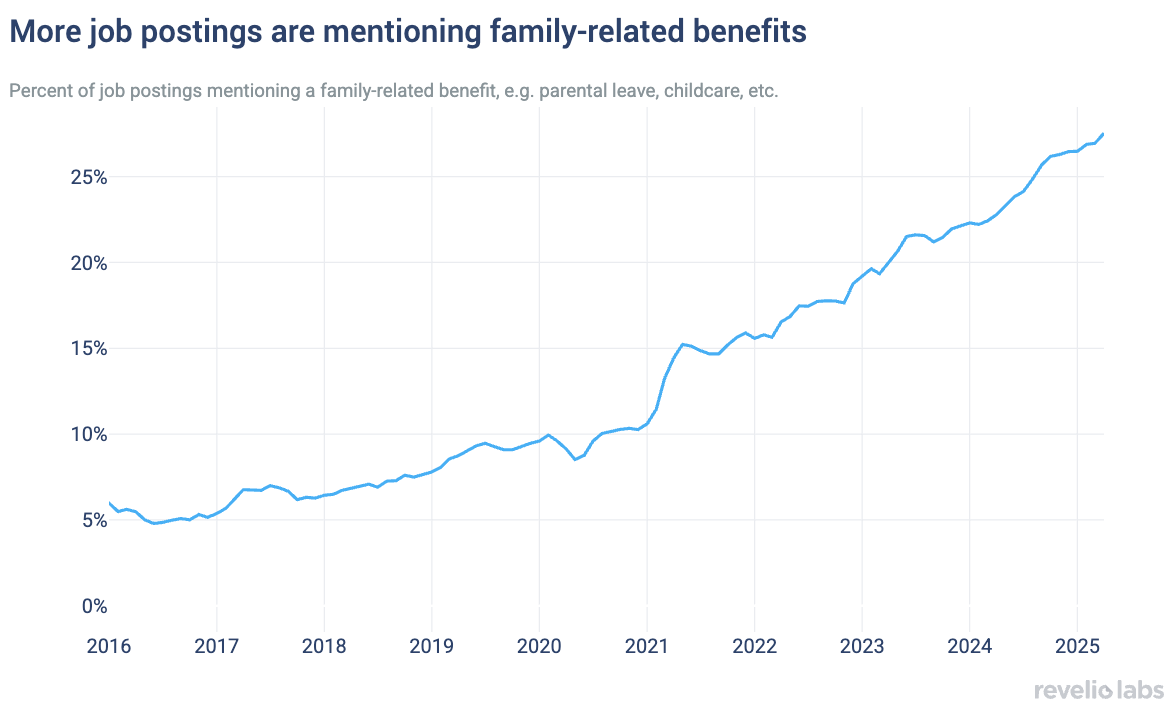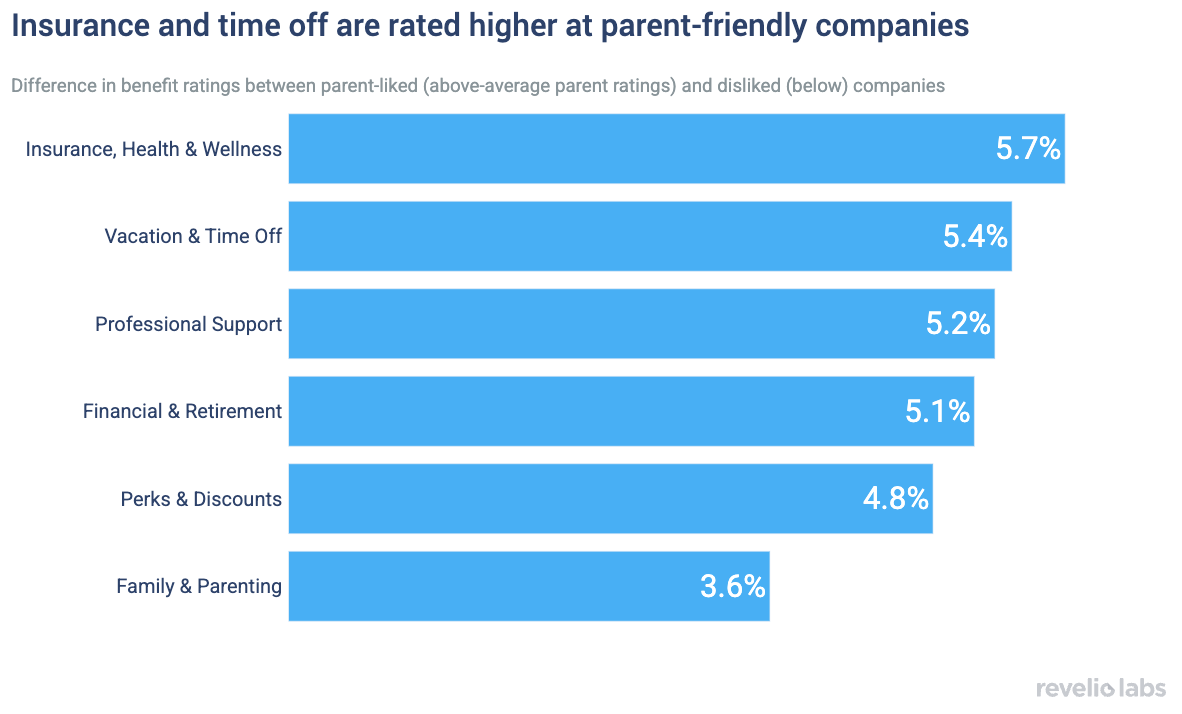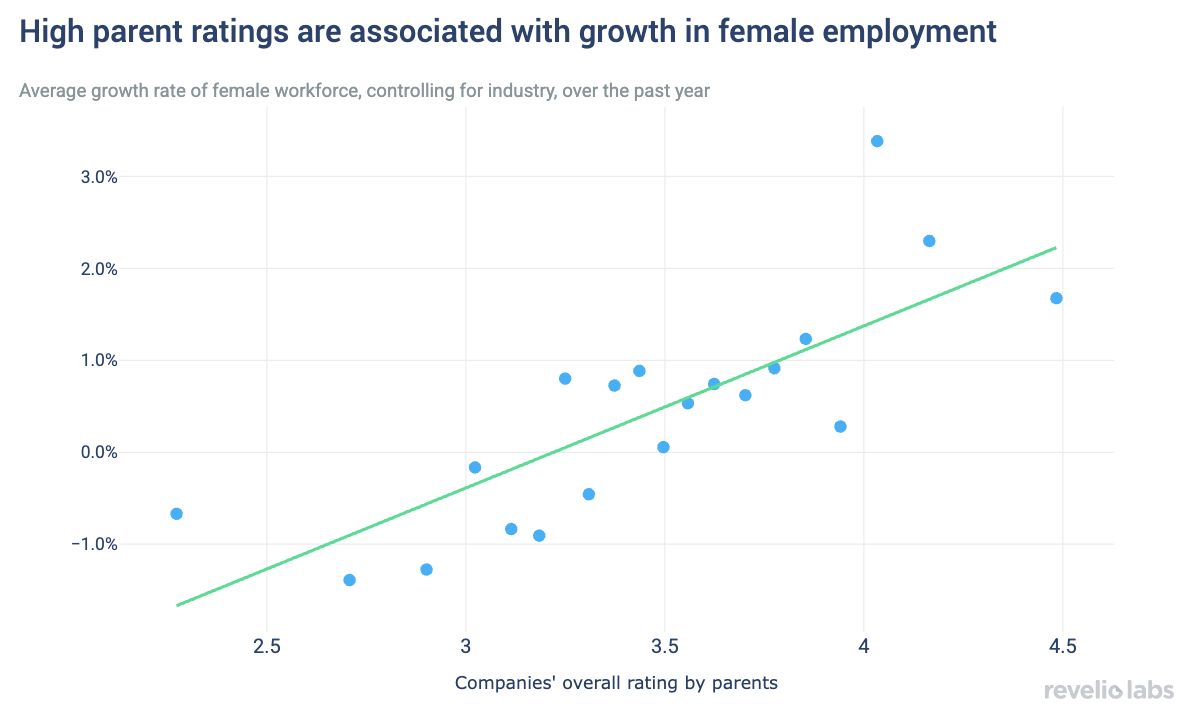Benefits Matter for Working Parents, but Culture Makes the Difference
What it takes to be a parent-friendly company

The share of job postings mentioning family-related benefits, including parental leave and childcare, has risen from about 6% in 2016 to more than 25% in 2025 as more companies are trying to appeal to working parents. However, a benefits package is not enough to make parents happy: What matters more broadly is a positive and supportive company culture.
Parent-friendly companies, which have higher-rated benefits packages across the board, also tend to grow their female workforces more quickly than parent-disliked companies.
Relative to their industry, Trader Joe’s and H-E-B are parents’ favorite employers, whereas GEICO and Union Pacific are among the least liked by parents relative to their respective industries.
As the costs and other challenges of parenthood mount each year, more companies have sought to address these challenges to grow and retain their workforces. However, this trend hasn't been uniform. While many companies have improved or introduced new family-related benefits appealing to working parents, who are often mid-career millennials and some of the more experienced, productive members of workforces, others haven't. In fact, some companies have even taken steps backwards by cutting parental benefits. This week, we use Revelio Labs workforce data to take a look at the friendliness of different workplaces to parents and what that can mean for workforce outcomes.
To start, we track the increasing focus on working parents by companies as evidenced by job postings. Since 2015, mentions of family-related benefits—e.g. parental leave, childcare, and fertility assistance—have risen more than fourfold, from about 6% in 2016 to more than 25% so far in 2025. Mentions of parental leave in particular are up from a rate of less than 1% of postings to about 11% of postings over that time.


But are family-related benefits enough to retain working parents? An analysis of Revelio Labs employee reviews data shows that what working parents value (or dislike) about a company extends far beyond benefits (or lack thereof). Like other employees in general, parents tend to weigh a company’s culture and values most when they are considering their overall experience: We find that a 1% increase in how well parents rate a company’s culture and values is associated with a 0.27% increase in how well they rate it overall. Culture is followed by career opportunities and senior management, which are associated with 0.19% and 0.15% increases in overall rating, respectively. On the other hand, compensation and benefits tend to have a smaller association (+0.11%) with overall satisfaction.
While compensation and benefits ratings as a whole are not the main driver of parent satisfaction, not all benefits are created equal: Some of them may be quite important for parents specifically. To look at this, we compare the benefit categories ratings of companies in the top half of parent ratings to those of companies in the bottom half. The top half of companies outperform the less parent-friendly set the most in terms of insurance, health and wellness benefits, and—perhaps surprisingly—least in terms of family and parenting benefits, which most commonly include parental leave and childcare.


In short, it seems that, rather than specific benefits, parents are attracted to a broader culture of support and inclusion, which can truly matter for their career progression. This intuition is supported by the finding that the rating of a company among working parents is associated with clear workforce patterns in the female workforce of each company. Binning together companies with similar parent ratings and comparing these companies’ growth rates for female workers, we see a clear relationship. Simply put, Revelio Labs workforce data show that companies rated under 3 (on a scale of 1-5) by parents tend to have negative female growth rates, whereas those rated above 3 tend to have positive ones.


Who are some of these standout companies in the eyes of working parents, and which are most subpar? Relative to their industry, grocery retail favorites Trader Joe’s and H-E-B are rated most positively by their parent employees, with Total Quality Logistics not far behind. On the flip side, the companies rated lowest by parents relative to their industries include GEICO, Union Pacific, and Family Dollar.


How adequately a company is able to accommodate the varied needs of its workforce is likely to have an impact on both talent attraction and retention. As the challenges of parenthood continue to intensify, so will the costs to companies of falling short in the eyes of working parents. While offering family-related benefits is a strong first step, it's the company’s broader culture, values, and overall support systems that truly move the needle for working parents.


